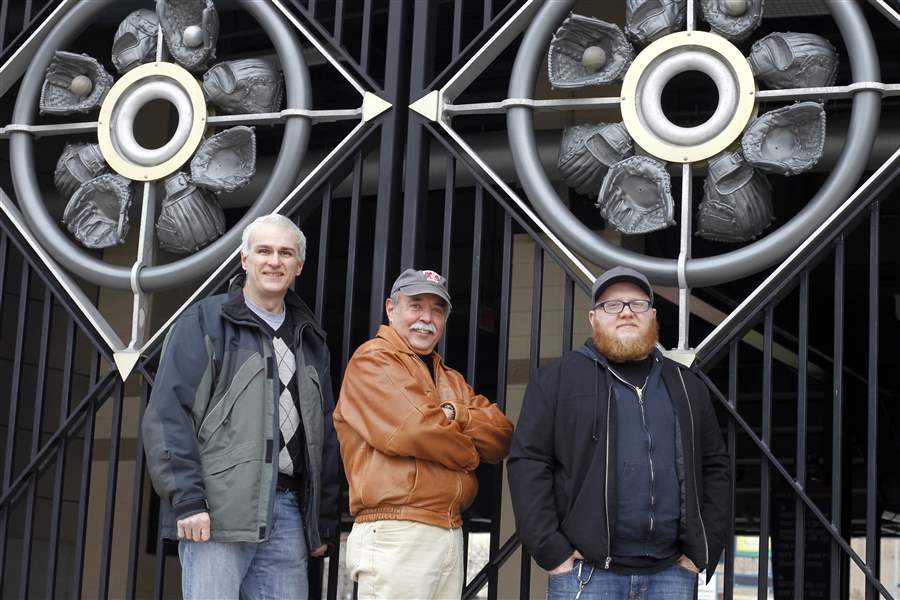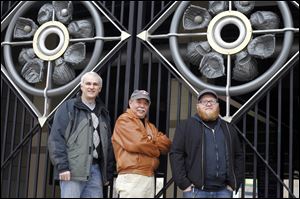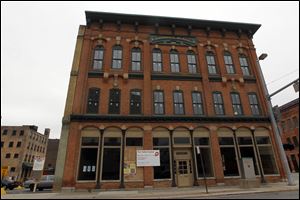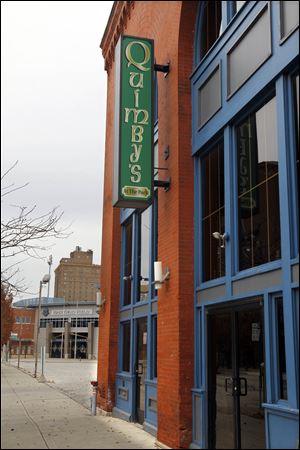
RELIGION
Amen to ale: Local Lutherans found Black Cloister Brewing Co.
11/30/2013
The Rev. Tom Schaeffer, left, CEO of Black Cloister Brewing Company, Bob Hall, center, and Scott Biddle stand in front of Fifth Third Field.
The Blade/Amy E. Voigt
Buy This Image

The Rev. Tom Schaeffer, left, CEO of Black Cloister Brewing Company, Bob Hall, center, and Scott Biddle stand in front of Fifth Third Field.
Martin Luther might best be known as the namesake of the Lutheran Church, but Lutherans who know his biography also talk about his fondness for beer. Luther, who lived from 1483 to 1546, said, “I'd rather my people were in the alehouse thinking of church, than in church thinking of the alehouse.”
Four area Lutherans are keeping the church and the alehouse in close contact as they bring to life Black Cloister Brewing Co.; Luther's wife, a former nun (he had been a monk), brewed beer for him at their home, the Black Cloister, in Wittenberg, Germany.
The Rev. Tom Schaeffer, 50, the CEO of Black Cloister, is a Lutheran church planter. “As a pastor in a new church with a median age of 28, I need to be creative about the financial sustainability of our ministry, as well as providing an alternative source of income for myself so that I might reduce my burden on the church.”
In his corporate research, Pastor Schaeffer found breweries located in former churches, and he looked into Luther House, a Seattle bar and restaurant that is “a business run by the church. We decided not to do that. We decided to create this business completely as a separate entity,” he said.
Pastor Schaeffer planted Threshold Church in 2009 in a nightclub, then it was in a storefront on Bancroft Street, and it recently moved to a former Roman Catholic church building at 130 Maple St., Rossford, where it has services at 11 a.m. on Sundays.

619 Monroe St. is one possible site for Black Cloister Brewing Company, which is about a block from Fifth Third Field.
Since Pastor Schaeffer sees his religious mission to be starting new churches, he didn't want to make beer-making a job description for Threshold's next pastor, should he leave. “We'll always support Threshold; they don't have to worry about the brewery,” he said. Black Cloister's bylaws say that Threshold will receive 20 percent of the profits.
It was almost coincidence that all four members of Black Cloister's core team are Lutherans. Scott Biddle, Threshold's music director, is in charge of marketing, promotions, and graphic design. Mike Kennedy is involved in the development of Black Cloister's building and then he'll head the sales effort. Pastor Schaeffer was “pretty sure,” he said, that Bob Hall, “our guy who has the most brewing experience and our best brewer,” was Lutheran, but that wasn't confirmed until he was on staff. “All of us have brewed,” Pastor Schaeffer said. “We all know beer. We each bring our own specialty to it.”
Black Cloister just negotiated a lease to house its brewery and tap room, and eventually a brew pub, in a building a block from Fifth Third Field. Pastor Schaeffer hopes to open in May. “Obviously, with the location, we want to be in during baseball season. That's going to be big for us,” he said.
The company couldn't start the government permitting process until it had an address. It also couldn't order its nearly $200,000 15-barrel brewing system until there was a place to put it.
Black Cloister is still working on its initial funding. The company recently took part in a campaign on the Web site Kickstarter to get financing from the general public. The company asked for $55,000 and fell far short. “It clearly was a tactical blunder on our part to set the number so high,” Pastor Schaeffer wrote on the company's Facebook page. The terms of a Kickstarter campaign are that if the goal is not reached, none of the funds are collected.
Pastor Schaeffer expressed disappointment that according to Kickstarter terms he couldn't include the charitable angle. “Our whole vision is built around ministry, leveraging our business for good, and we couldn't talk about that stuff.”
The Kickstarter failure “won't kill us, but it does hurt us,” Pastor Schaeffer said. But the company is moving forward.
“Long term, our goal is to be a production brewery for sale” through other businesses, Pastor Schaeffer said, making beer and possibly cider. “In the short term, your tap room sales can be what make or break you.”

25 Huron St. is one possible site for Black Cloister Brewing Company.
Black Cloister will likely offer an abbey ale (abbey, like cloister, is a term for a monastery) called Marty. “The beers that Luther drank would have most closely resembled the abbey ales of today,” Pastor Schaeffer said. Also look for a pilsner brewed by Mr. Hall. “If you know your church history, you know that the Reformation was in many ways birthed before Luther, and there was a gentleman named Jan Hus. Hus is a Czech, so I really think that when we do a Bohemian pilsner, a Czech pilsner, it ought to be called Little Hussy. (Laughs.) Some people will get that joke and others won't.”
Making alcohol to fund a religious society—in Black Cloister's case, you might call it the “church Hussy” model—is an old practice that is in revival today. “Monasteries for hundreds of years have brewed beer,” Pastor Schaeffer said. He spoke of doppelbocks, beers “essentially developed to see the monks through the fasting of Lent” when they didn't eat but could drink, and the doppelbock was called “liquid bread.”
Religion and alcohol don't align in some religions. “I know it will upset the moralistic sensibilities of some in the church, but within the Lutheran tradition we don't see alcohol as a sin. What the Bible says is, essentially, don't drink to get drunk. We believe in moderation. Our brewery is obviously going to be very intentional about moderation for our customers.,” Pastor Schaeffer said.
Moderation will be a guide for consumption, but there won't be a sober atmosphere; the Cloister workers will have fun with the Lutheran tie-in. They have Luther's legacy to carry on. As Luther said, “Whoever drinks beer, he is quick to sleep; whoever sleeps long, does not sin; whoever does not sin, enters Heaven! Thus, let us drink beer!”
Contact TK Barger @ tkbarger@theblade.com, 419-724-6278 or on Twitter @TK_Barger.